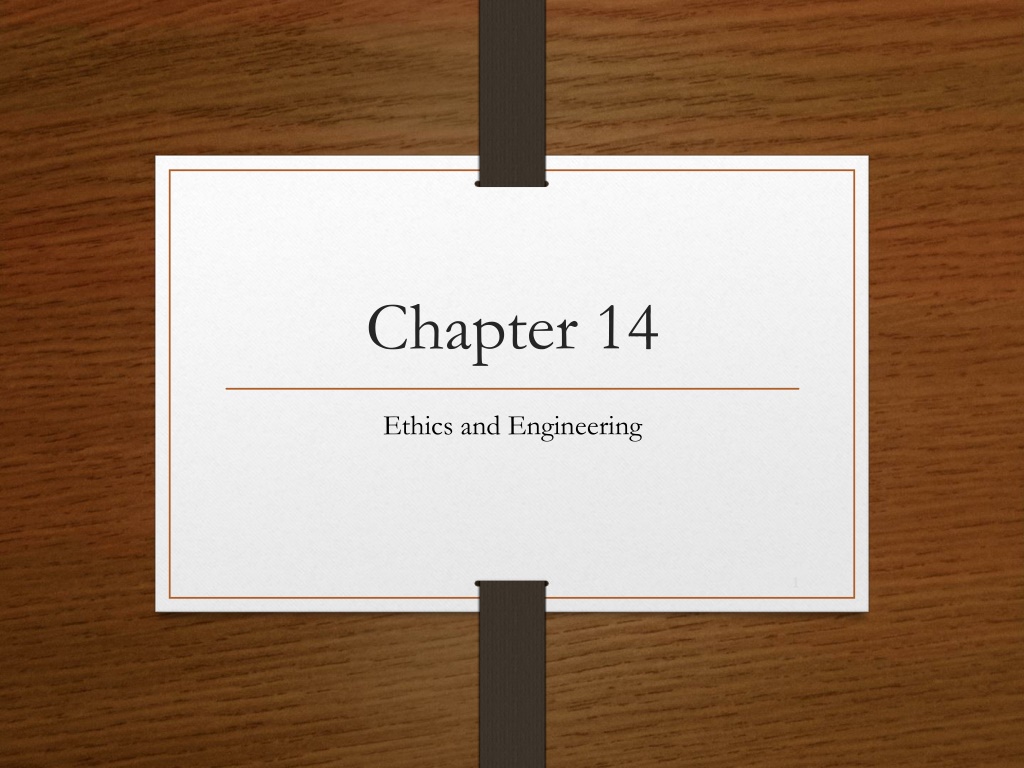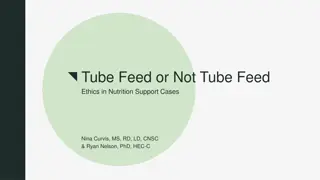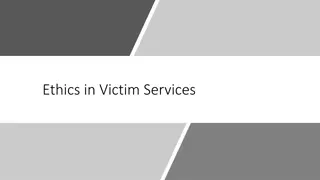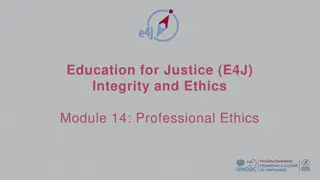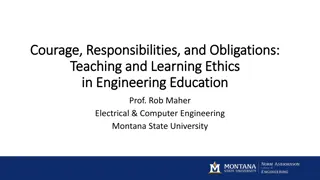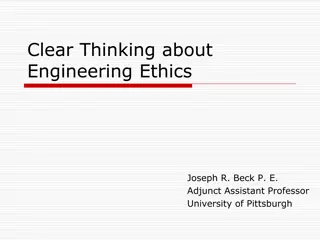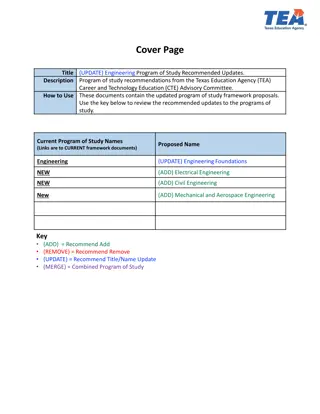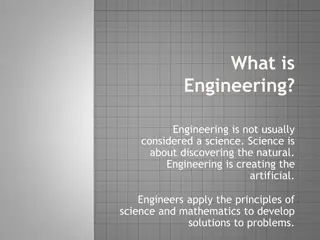Understanding Ethics and Engineering Principles
Explore the fundamental principles of engineering ethics, including resolving ethical dilemmas, reviewing professional conduct rules, and examining the differences between law and ethics. Delve into case studies to analyze ethical issues and decision-making from various perspectives.
Download Presentation

Please find below an Image/Link to download the presentation.
The content on the website is provided AS IS for your information and personal use only. It may not be sold, licensed, or shared on other websites without obtaining consent from the author. Download presentation by click this link. If you encounter any issues during the download, it is possible that the publisher has removed the file from their server.
E N D
Presentation Transcript
Chapter 14 Ethics and Engineering 1
Lecture Objectives and Activitivies Teach fundamental principles and canons of engineering ethics Clarification of nature of ethics Process to resolve ethical dilemmas NCEES Model Rules of Professional Conduct ASME Code of Ethics Provide case studies to examine issues and resolve problems from a second person perspective 2
The Nature of Ethics Ethics is generally concerned with rules or guidelines for morals and/or socially approved conduct Ethical standards generally apply to conduct that can or does have a substantial effect on people s lives 3
Law vs. Ethics LAW ETHICS Offers guidance on conduct Addresses situations in which competing values clash Incentives and disincentives may be created by group (formal or informal) Creates rules to guide conduct Balances competing values Punishes conduct that is illegal through formal structures 4 From CSUN ME Senior Ethics Lecture
Is legal the same as ethical? YES: Law defines duties, rights, allowable conduct. Compliance approach to business ethics: fulfill legally recognized duties, and don t go further. NO: Law does not address all ethical dilemmas Legal duties may not meet standard of ethical conduct Beyond Compliance approach: fulfill legally recognized duties, but don t stop there. In case of conflicts, it s generally held that legal standards must give way to ethical standards 5 From CSUN ME Senior Ethics Lecture
Consider This: You and Al You are the manager for Big-Mart, a large discount retailer. You recently fired Al, a sales clerk, after Al punched a customer during a dispute in the store (Al admitted this after the customer complained). Sue, manager of your competitor, Mega-Mart, calls you to tell you that Al has applied for a job at Mega-Mart, and to ask you whether Al is good with customers. WHAT DO YOU DO? 6 From CSUN ME Senior Ethics Lecture
An ethical dilemma? Choice to be made Implicates competing values, rights, & goals Potential harm to decision maker? Potential harm to others? Ripple effect: long-term, far reaching implications of decision to be made. 7 From CSUN ME Senior Ethics Lecture
How to Resolve Ethical Dilemmas Identify relevant facts Identify relevant issue(s) Identify primary stakeholders Identify possible solutions Evaluate each possible solution Compare and assess consequences Decide on solution Take action 8 From CSUN ME Senior Ethics Lecture
How to Evaluate Solutions: Some Theories Stakeholder/utilitarian theory: greatest good to the greatest number Rights Theory: Respecting and protecting individual rights to fair and equal treatment, privacy, freedom to advance, etc. Justice Theory: fair distribution of benefits and burdens: can harm to individual be justifiable? Categorical Imperative: what if everyone took such action? Front Page Test: What if my decision was reported on the front page of the Los Angeles Times? 9 From CSUN ME Senior Ethics Lecture
Legal vs. Ethical: You and Al Legal Al admitted to punching a customer. Illegal [You contact another store, X-Mart, to warn about Al] He is great with customers. 10 Ethical? Unethical? No comment From CSUN ME Senior Ethics Lecture
NCEES Model Rules of Professional Conduct NCEES is the National Council of Examiners for Engineering and Surveying http://www.ncees.org/ 11
The Preamble Purpose is to safeguard life, health, and property, to promote the public welfare, and to maintain a high standard of integrity and practice. 12
Obligation to Society Broad context of responsibility 1. While performing services, the engineer s foremost responsibility is to the public welfare 2. Engineers shall approve only those designs that safeguard the life, health, welfare, and property of the public while conforming to accepted engineering standards Whistle blowing 3. If an engineer s professional judgment is overruled resulting in danger to the life, health, welfare, or property of the public, the engineer shall notify his/her employer or client and any appropriate authority 13
Obligation to Society Truth in duties 4. Engineers shall be objective and truthful in professional reports, statements, or testimonies and shall provide all pertinent supporting information relating to such items 5. Engineers shall not express a professional opinion publicly unless it is based upon knowledge of the facts and a competent evaluation of the subject matter The Duty of Full Disclosure 6. Engineers shall not express professional opinion on subject matters for which they are motivated or paid, unless they explicitly identify the parties on whose behalf they are expressing the opinion and reveal the parties interest in the matters 14
Obligation to Society Clean Hands Rule 7. Engineers shall not enter business ventures or permit their names or their firm s names to be used by any persons or firm which is engaging in dishonest, fraudulent, or illegal business practice Final Obligation to Society 8. Engineers who have knowledge of possible violation of any of the rules listed in this and the following two parts shall provide pertinent information and assist the state board in reaching final determination of the possible violation 15
Engineers Obligation to Employers and Clients Professional competence 1. Engineers shall not undertake technical assignments for which they are not qualified 2. Engineers shall approve or seal only those plans or designs that deal with subjects in which they are competent and which have been prepared under their direct control and supervision 16
Engineers Obligation to Employers and Clients Professional competence 1. Engineers shall not undertake technical assignments for which they are not qualified 2. Engineers shall approve or seal only those plans or designs that deal with subjects in which they are competent and which have been prepared under their direct control and supervision 17
Engineers Obligation to Employers and Clients The Validity of Approvals Engineers may coordinate an entire project provided that each design component is signed or sealed by the engineer responsible for that design component 18
Engineers Obligation to Employers and Clients Confidentiality Requirement Engineers shall not reveal professional information without the employer s or client s prior consent except as authorized or required by law 19
Engineers Obligation to Employers and Clients Conflict of Interest 1. Engineers shall not solicit or accept direct or indirect considerations, financial or otherwise, from contractors, their agents, or other parties while performing work for employers or clients 2. Engineers shall disclose to their employers or clients potential conflicts of interest or any other circumstances that could influence or appear to influence their professional judgment or their service quality 20
Engineers Obligation to Employers and Clients Full Disclosure An engineer shall not accept financial or other compensation from more than one party for services rendered on one project unless the details are fully disclosed and agreed by all parties 21
Engineers Obligation to Employers and Clients Government Conflicts of Interest To avoid conflicts of interest, engineers shall not solicit or accept a professional contract from a governmental body on which a principal or officer of their firm serves as a member. An engineer who is a principal or employee of a private firm and who serves as a member of a governmental body shall not participate in decisions relating to the professional services solicited or provided by the firm to the governmental body 22
Engineers Obligations to Other Engineers Obligation to Potential Employers Engineers shall not misrepresent or permit misrepresentation of their or any of their associate s academic or professional qualifications. They shall not misrepresent their level of responsibility or the complexity of prior assignments. Pertinent facts relating to employers, employees, associates, joint ventures, or past accomplishments shall not be misrepresented when soliciting employment or business 23
Engineers Obligations to Other Engineers Conflicts of Interest Engineers shall not directly or indirectly give, solicit, or receive any gift or commission, or other valuable consideration, in order to obtain work, and shall not make contribution to any political body with intent of influencing the award of contract by governmental body 24
Engineers Obligations to Other Engineers Reputations of Other Engineers 1. Engineers shall not attempt to injure, maliciously or falsely, directly or indirectly, the professional reputations, prospects, practice or employment of other engineers, nor indiscriminately criticize the work of other engineers 2. Criticize cautiously and objectively with respect to the person s professional status 25
Engineering Ethics and Legal Issues Contract Law Mutual agreement between two or more parties to engage in transaction which provides benefits to each of them 1. Mutual consent 2. Offer and acceptance 3. Consideration 26
Engineering Ethics and Legal Issues Other Contract Issues 1. Legally enforceable agreement requires a definite promise by each party to do something specific 2. Some benefit received that each did not have before 3. Does not have to be in writing to be valid 27
Engineering Ethics and Legal Issues An actual violation of the terms in the contract must occur 1. Items not supplied, supplied but of substandard quality, or not supplied until long after a deadline 2. Party required to provide an equivalent value previously offered 3. Inability to fulfill contract is under ethical and legal imperative to do everything possible to provide equivalent value to other party Breach of Contract 28
Engineering Ethics and Legal Issues The Letter vs. Spirit of the Law Read between the lines in terms of the intent of those documents as understood by those who formulated them 29
ASME Code of Ethics of Engineers Fundamental Principles Engineers uphold and advance the integrity, honor, and dignity of the Engineering profession by: using their knowledge and skill for the enhancement of human welfare; being honest and impartial, and serving with fidelity the public, their employers and clients, striving to increase the competence and prestige of the engineering profession. 30
ASME Code of Ethics of Engineers Fundamental Canons (1) Engineers shall hold paramount the safety, health and welfare of the public in the performance of their professional duties. Engineers shall perform services only in the areas of their competence. Engineers shall continue their professional development throughout their careers and shall provide opportunities for the professional development of those engineers under their supervision. 31
ASME Code of Ethics of Engineers Fundamental Canons (2) Engineers shall act in professional matters for each employer or client as faithful agents or trustees, and shall avoid conflicts of interest. Engineers shall build their professional reputations on the merit of their services and shall not compete unfairly with others. Engineers shall associate only with reputable persons or organizations. Engineers shall issue public statements only in an objective and truthful manner. 32
Group Exercise Each group is given 10 minutes to discuss and prepare solutions in Powerpoint, and 5 minutes for presentation to class and Q&A Group 1: Case 1 (14.3) Group 2: Case 2 (14.4) Group 3: Case 3 (14.6) Group 4: Case 4 (14.7) Group 5: Case 4 (14.7) Cases are designed as problems for you, so seek resolutions that you personally can live with. 33
Case 1 Newly hired as a production engineer, you find a potential problem on the shop floor: workers are routinely ignoring some of the government mandated safety regulations governing the presses and stamping machines. The workers override the safety features such as guards designed to make it impossible to insert a hand or arm into a machine. Or they rig up "convenience" controls so they can operate a machine while close to it, instead of using approved safety switches, etc., which requires more movement or operational steps. Their reason (or excuse) is that if the safety features were strictly followed then production would be very difficult, tiring and inefficient. They feel that their shortcut still provides adequately safe operation with improved efficiency and worker satisfaction. Should you immediately insist on full compliance with all the safety regulations, or do the workers have enough of a case so that you would be tempted to ignore the safety violations? And if you're tempted to ignore the violations, how would you justify doing so to your boss? Also, how much weight should you give to the workers' clear preference for not following the regulations: ethically, can safety standards be relaxed if those to whom they apply want them to be relaxed? 34
Case 2 You and an engineer colleague work closely on designing and implementing procedures for the proper disposal of various waste materials in an industrial plant. He is responsible for liquid wastes, which are discharged into local rivers. During ongoing discussions with your colleague, you notice that he is habitually allowing levels of some toxic liquid waste chemicals, which are slightly higher than levels permitted by the law of those chemicals. You tell him that you have noticed this, but he replies that, since the levels are only slightly above the legal limits, any ethical or safety issues are trivial in this case, and not worth the trouble and expense to correct them. Do you agree with your colleague? If not, should you attempt to get him to correct the excess levels, or is this none of your business since it is he rather than you who is responsible for liquid wastes? If he refuses to correct the problems, should you report this to your boss or higher management? And if no one in your company will do anything about the problem, should you be prepared to go over their heads and report the problem directly to government inspectors or regulators? Or should one do that only in a case where a much more serious risk to public health and safety involved? 35
Case 3 Your company has for some time supplied prefabricated wall sections, which you designed, to construction companies. Suddenly one day a new idea occurs to you about how these might be fabricated more cheaply using composites of recycled waste materials. Pilot runs for the new fabrication technique are very successful, so it is decided to entirely switch over to the new technique on all future production runs for the prefabricated sections. But there are managerial debates about how, or even whether, to inform the customers about the fabrication changes. The supply contracts were written with specifications and functional terms, so that love bearing capacities and longevity, etc., of the wall sections were specified, but no specific materials or fabrication techniques were identified in the contracts. Thus it would be possible to make the changeover without any violation of the ongoing contracts with the customers. On the other hand, since there is significant cost savings in the new fabrication method, does your company have an ethical obligation to inform the customers of this, and perhaps even to renegotiate supply at reduced cost, so that the customers also share in benefits of the new technique? More specifically, do you have any special duty, as a professional engineer and designer of the new technique, to be an advocate in your company for the position that customers should be fully informed of the new technique and the associated cost savings? 36
Case 4 Your company manufactures security systems. Up to now these have raised few ethical problems, since your products were confined to traditional forms of security, using armed guards, locks, reinforced alloys which are hard to cut or drill, and similar methods. However, as a design engineer you realize that this modern technology much more comprehensive security packages could be provided to your customers. These could also include extensive video and audio surveillance equipment, along with biometric monitoring devices of employees or other personnel seeking entry to secure areas which would make use of highly personal data such as a person s fingerprints, or retinal or voice patterns. But there is a problem to be considered. A literature search reveals that there are many ethical concerns about the collection and use of such personal data. For example, these high-tech forms of surveillance could easily become a form of spying, carried out without the knowledge of employees and violating their privacy. Or the data collected for security reasons could easily be sold or otherwise used outside legitimate workplace contexts by unscrupulous customers of your surveillance systems. Your boss wants you to include as much of this advanced technology as possible in future systems, because customers like these new features and are willing to pay well for them. However, you are concerned about the ethical issues involved in making these new technologies available. As an engineer, do you have any ethical responsibility to not include any such ethically questionable technologies in products which you design and sell, or to include them only in forms which are difficult to misuse? Or is the misuse of such technologies an ethical problem only for the customers who are buying your equipment, rather than it being your ethical responsibility as an engineer? 37
Lecture Recap, Homework, and Next Lecture Ethics is generally concerned with rules or guidelines for morals and/or socially approved conduct Ethical standards generally apply to conduct that can or does have a substantial effect on people s lives Assignments: 15.1,15.2,15.5,15.10 38
References CSUN ME Senior Design Lecture notes Engineering Your Future, A Comprehensive Approach, Sixth Edition, by Oakes, Leone, Gunn. Publisher: Great Lake Press http://www.asme.org/Education/PreCollege/Teach erResources/Code_Ethics_Engineers.cfm 39
